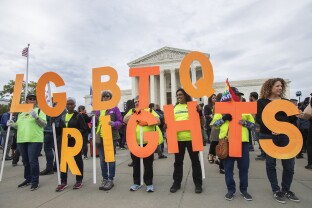Republicans are preparing for a Supreme Court case that will determine whether state laws banning gender-affirming care for transgender youth are constitutional. Their main argument relies on one of the court’s most consequential precedents: the Dobbs decision.
The Tennessee attorney general’s office — the defendant in the case — is arguing that federal courts should not take the role of legislatures, an argument Republicans and conservatives backed when Roe v. Wade was being challenged.
“This is central to our argument on the right … asking the court to relegate this issue to the people and their legislators,” said Jon Schweppe, policy director for the American Principles Project, a conservative organization that works with lawmakers to introduce anti-trans measures. “So, similar to Dobbs in that the left is seeking an outcome where the court is weighing in and preventing the people from having a say.”
